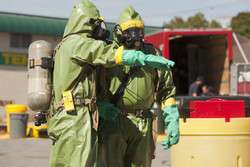DARIUS project is working to enhance search and rescue operations

From the nuclear disaster at Fukushima to the recent landslides in Sri Lanka – the number of natural and man‐made disasters in the world increases every year. As our urban populations continue to swell, the concentration of people in cities combined with haphazard planning amplifies the effects of these disasters, complicates Search And Rescue (SAR) operations and put first responders at risk. The DARIUS ('Deployable SAR Integrated Chain with Unmanned Systems') project is addressing this problem with the aim of providing unmanned platforms for search and rescue operations.
While building on the work of completed and ongoing projects, DARIUS is focusing on aspects that have received less attention in the use of the unmanned systems in SAR operations, namely enhancing interoperability performances at procedural and technical levels.
Unmanned systems are now commonly used in military and para‐military programmes, but there are added complications when it comes to using them in Search and Rescue (SAR) operations. Unlike in the military sector, each agency in the safety sector has a very limited budget. As such, unmanned systems should be shared between several agencies and provide information and services to all first responders deployed on the field. The level of interoperability necessary to achieve this demands the integration of unmanned systems into the overall command and control cycle, and research into achieving this is one of the major focuses of the DARIUS team.
The necessity to share systems between several agencies demands the development of a 'Generic Ground Station (GGS)' that allows users to control and/or to collect and exploit information from various platforms (air, ground and maritime) through the same general interface. The GGS concept along with a First responder Shared Data Base (FSB) concept, are both being further developed by DARIUS.
One of the key features of the DARIUS project is cooperation and communication with end-users. For example, earlier this month, the DARIUS project organised a two-day pre-trial training session and a forest fire trial for the officers of the Greek Fire Service and the students of the Greek Fire Academy. The training programme focused on the aerial unmanned platforms and ground robots participating in the fire trial, covering the concept of interoperability and its technical and operational dimension. Then a selected group of ten fire officers participated in a DARIUS forest fire trial in the Alykes site in Anavyssos, south of Athens. The aim was to demonstrate the potential of technical and operational interoperability delivered by DARIUS and how unmanned platforms can contribute to emergency management, supporting SAR operations.
It is hoped that interactions like this with end users will maximise the impact of DARIUS on citizen safety and security. Mindful that financial constraints are an ever-present issue for the sector, the team is also working with end users to verify that they would buy DARIUS solutions and components and that the business models elaborated by DARIUS are valid. The project is due for completion in February 2015, and all DARIUS partners have developed a clear exploitation plan to leverage the project's achievements in the short, mid and long terms.
Provided by CORDIS




















